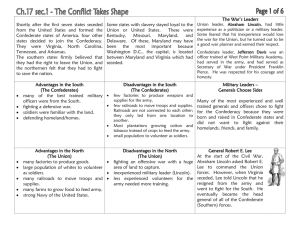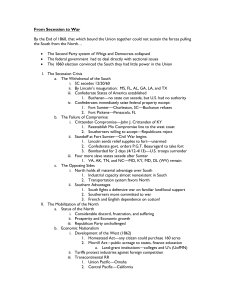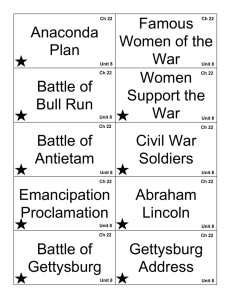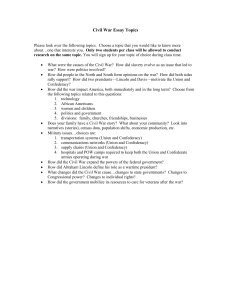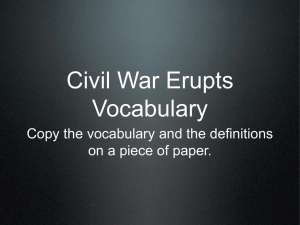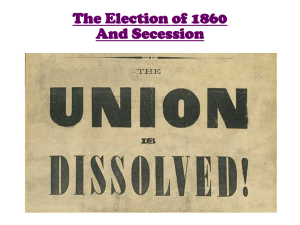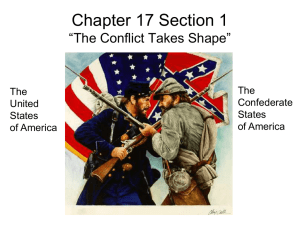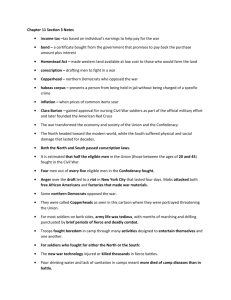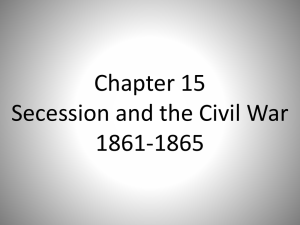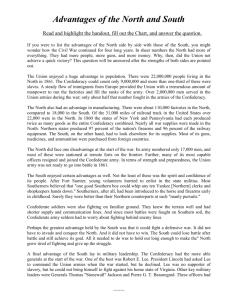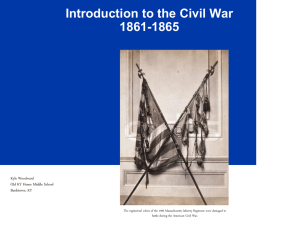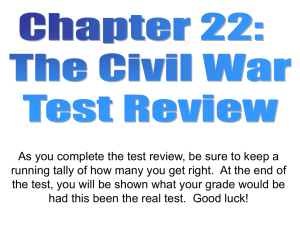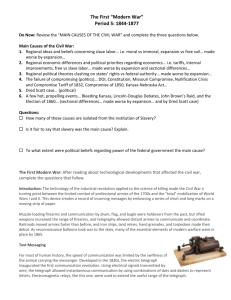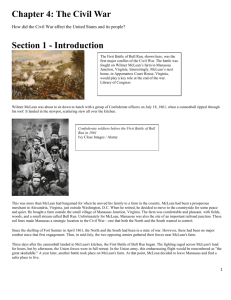Chap. 11 Notes
advertisement
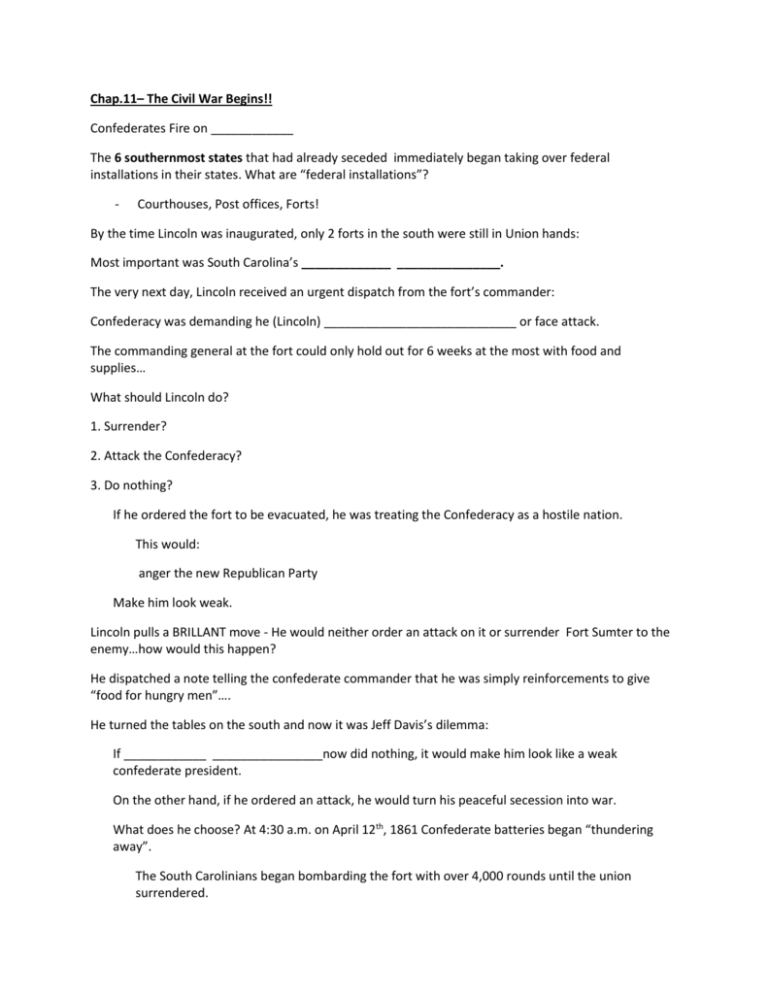
Chap.11– The Civil War Begins!! Confederates Fire on ____________ The 6 southernmost states that had already seceded immediately began taking over federal installations in their states. What are “federal installations”? - Courthouses, Post offices, Forts! By the time Lincoln was inaugurated, only 2 forts in the south were still in Union hands: Most important was South Carolina’s _____________ _______________. The very next day, Lincoln received an urgent dispatch from the fort’s commander: Confederacy was demanding he (Lincoln) ____________________________ or face attack. The commanding general at the fort could only hold out for 6 weeks at the most with food and supplies… What should Lincoln do? 1. Surrender? 2. Attack the Confederacy? 3. Do nothing? If he ordered the fort to be evacuated, he was treating the Confederacy as a hostile nation. This would: anger the new Republican Party Make him look weak. Lincoln pulls a BRILLANT move - He would neither order an attack on it or surrender Fort Sumter to the enemy…how would this happen? He dispatched a note telling the confederate commander that he was simply reinforcements to give “food for hungry men”…. He turned the tables on the south and now it was Jeff Davis’s dilemma: If ____________ ________________now did nothing, it would make him look like a weak confederate president. On the other hand, if he ordered an attack, he would turn his peaceful secession into war. What does he choose? At 4:30 a.m. on April 12th, 1861 Confederate batteries began “thundering away”. The South Carolinians began bombarding the fort with over 4,000 rounds until the union surrendered. The news united the North. Bad news for the upper southern states how haven't seceded yet: ______________ couldn’t fight against other southern states and seceded shortly after. Terrible loss for the ______________ , most heavily populated state in the south and the most industrialized. I. Americans Expect a ___________ _____________ A. Union and Confederate __________________ 1. 2 sides were unevenly matched – Union had more _______________than the ______________ - more fighting powe - more factories - greater food production - extensive railroad system 2. South also had advantages: ____________– profits help fund their side, strong _______________ __________________ 3. Two sides had different military strategies: -Union: - Blockade southern ports - Move down rivers to split confederacy in 2 - Capture the________________ of Confederate ____________________! - Plan was called the _________________ __________________. South’s strategy was mostly defensive.. Lets Review 1. What were the advantages of the North? - more ________ ____________ - factories, greater ______________ _____________ - extensive _____________ _____________ 2. What were the advantages of the South? - 1st rate generals - highly motivated soldiers The Politics of War.. A. Britain Remains Neutral: Britain didn’t depend on the south’s cotton crop, found new sources in________________ and ____________– Saw no reason to really help out.. I. Trent ____________________ a. Confed. govt sent 2 diplomats: James Mason and John Slidell to gain support form Britain AND France… 2. The 2 men traveled on a British ship the ________________ 3. An American warship stops the Trent and arrests the 2 men! a. Brits threatened war against the U.S. and sent 8,000 troops to Canada. b. Lincoln freed the 2 men and backed down to avoid another war. (Britain was also VERY relieved) II. Proclaiming_________________________! (What is emancipation?) 1. Who builds the fortifications and grows the food for the Confederacy? (Slave Labor) 2. As Commander in Chief, Lincoln decided that just as he could order the Union to seize supplies, he could also authorize the army to emancipate slaves. 3. The Emancipation Proclamation was basically a ______________ ______________ a. Abolitionist movement was strong in Britain, therefore they received support towards the North rather than the South. III. Reactions to the Proclamation 1. Gave the war a_____________ ______________– a purpose 2. ______________ _______________began to enlist into the Union Army. 3. Many Union hated it, no love for abolitionists or free African Americans. 4. Made the South more determined to fight to “preserve their way of life” IV. Conscription.. 1. Heavy casualties on both sides would lead to conscription, a draft to force certain members of the population to serve in the army. 2. Both sides ran into trouble. a. Confederate law __________________ all able bodied white men between 18 and 35. b. They were allowed __________ ______________and put subs in their place. c. Planters with more than 20 _______________ were exempted. South complained “Rich Man’s war with the Poor Man’s Fight” . The North a. Union law drafted men between 20-45 for 3 years. b. Also allowed them to hire subs. c. In addition, could pay $300.00 fee to avoid conscription all together. Here is the interesting fact: Only 46,000 draftees actually went into the army. How many African Americans volunteered? 180,000. B. Bull Run.. 1. First major bloodshed occurred _________________ a. Army of 30,000 inexperienced Union soldiers on its way to Richmond came upon a Confederate army camp. 2. It was a “see saw” affair – what does that mean? 3. Confederates would hold, with heir general, Stonewall Jackson – Union troops retreated back… C. Union Armies out _________________ 1. Union armies now invaded western Tennessee and at its head was General Ulysses S. Grant. 2. Failed at EVERYTHING else in life – but was a brilliant general. 3. In about a week, overtook to ________________ controlled forts. D. A Revolution in warfare … 1.The _______________ _____________________was used for the first time and contributed to the war’s high casualty rate. 2. Ironclads could ____________________r wooden ships and resist burning. 3. Every Navy in the world took notice when the North’s ______________________took on the South’s Merrimack. 4. The Northern Naval Engineer, Gideon Wells designed it to look like a “Giant Cheese Box” 5. An even deadlier weapon? – The Rifle and the _______________ ________________ a. allowed soldiers to load rifles more efficiently and fire more round during warfare B. War for the Capitals! 1. Union did tighten its block against ________________________ _______________ 2. - Plan to capture the capital of ___________________________…ran into some problems 3. General of the armies (General____________________) was too cautious and command was passd to Robert E. Lee. Antietam… 1. Bloodiest single _____________________ in American history. 2. Causalites totaled more than 26,000 – the battle was more or less a standoff, 3. Instead of pursuing the already battered confederate army, McClellan , again, very cautious did nothing. 4. On November 7, 1862, Lincoln fired_____________________ and solved one of the problems. Life During wartime and Surrender at Appormatox African-American Soldiers 2nd year of the war – Congress passed a law allowing __________________ ________________to serve in the Union army. By war’s end, nearly _____________of the soldiers were African American. _____________regiments - Suffered discrimination Smaller allowances Fort Pillow The ________________ _______________of African American soldiers was much higher – why? A “gruesome” massacre took place at a prisoner of war cam – over 200 prisoners were slaughtered just because they were fighting on the Union side. War affects their economies: The South: Confederacy soon faced a ______________ ____________- why? Drain of ___________ Loss of slaves Union occupation of _____________ ____________ Union blockade of southern ports Northern Economic Growth: Industry boomed in the North – why? Army’s need for uniforms, Shoes, guns And other supplies supported mills and ________________ _______________ The downside.. People took advantage of this booming economy and _____________ grew all over the north. For example, businesses supplied uniforms, charged twice as much - but material was “shoddy” Passed spoiled meat off as fresh and demanded twice as much for guns and weapons that they made. Soldiers on both sides: Life on “the line”: In army camps, garbage disposals and bathrooms were nonexistent. Although army regulations required soldiers to wash their hands everyday and bath once a week, most refused to do so. What would result from this? Disease, lice, dysentery Food or “_______________” were even worse: Union troops, for example, lived on beans, bacon, and hardtack – square biscuits that were supposedly so hard they could stop a bullet. Confederate troops were just as bad: Common food was “Cush” a stew of small cubes of beef and bacon grease. War Medicine What technology in medicine had been developed at that time? Field Hospitals Surgeons toolkits Nurses Few doctors Prisons The worst Confederate prison was known as Andersonville. Jammed 33,000 men into 26 acres. No shelter from the sun. Drank from the same stream that served as their sewer. Malnutrition was rampant – most men starved to death or froze North Takes Charge!! Armies clash at __________________________ 3-Day battle at _____________________was considered a turning point of the Civil War 3 Day battle produced horrible losses: Union lost 23,000 men, while the south lost about 30,000 men. “Fly-infested corpses” lay everywhere in the heat and the stench was said to be unbearable. The south would never recover from the loss. The South surrenders By 1863, ________________, Mississippi was one of the last southern holdouts General Grant laid an artillery assault from land and sea. This forced the residents to take shelter, - food supplies ran low and finally, on July 3rd, 1863, the South surrendered and the army was cut in 2. Gettysburg Address In November of that same year, A ceremony was held to dedicate a cemetery in Gettysburg, PA. 1st speaker gave a “flowery” 2 hour speech. 2nd speaker was Lincoln who spoke for no more than 2 minutes.. Low Morale The South was deteriorating fast… Grant wanted to hurry up and win the war…so he appoints.. William ____________________ __________________ Both men believed in ______________ __________________ He promised to destroy the south’s will to fight – how would you do that? Sherman’s March Sherman marched his men southeast through Georgia, creating a wide path of destruction and living off the land as he went. Burned most of Atlanta to the ground ________________was next before he turned up North - met Grant - his goal? “To wipe out Lee”. It worked – Sherman burned everything in his path as he made his way back up to North Carolina. Surrender at Appomattox In March of 1865, President of the Confederacy abandoned their capital. Lee surrendered to General Grant at Appomattox Courthouse. The terms were generous. The Southern soldiers could go home and could kept all of their possessions What did the war mean for the country?? What kind of changes do you think happened after the war? Politically: “State’s Rights” vs. federal control is still an issue – especially how local funds are dispersed. Federal government had much more control – reached into your pockets – collected income tax – created the draft Economic changes: The economy of the northern states boomed. – why? It had devastated the South. – took away the south’s source of cheap labor – slavery. Before the war – the south held about half of the national wealth – now it held only 12%. The human costs of the war were staggering. Almost 400,000 soldiers on each side had died – Vets with missing limbs was common Disrupted education, careers and families. Who did the war affect most? African Americans – Lincoln felt the only legitimate thing to do was abolish slavery – became the 13th amendment in the Constitution.
